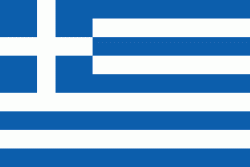Pteleos (Pteleós)
The area has been populated already since the prehistoric times; the ancient city of Pteleon is mentioned in Homer's Iliad, and several tombs from the Mycenean period survive between Pteleos and Agioi Theodoroi.
The current settlement lies to the north and land-inward of the ancient and medieval settlements in the area. An ancient settlement, which survived until early Byzantine times, was located on the southern coast of the Bay of Pteleos near the modern village of Achilleion, where a mosaic floor and remains of two early Christian basilicas have been found. The medieval settlement was located on the northern part of the Bay, near the modern village of Pigadi, and is attested for the first time in 1192, when "wine from Pteleos" (οἶνος Πτελεατικός) is mentioned as being traded in Constantinople.
After the Fourth Crusade (1204), the area passed under the control of the Frankish Kingdom of Thessalonica, but in 1218 it was recovered by the Despotate of Epirus. Epirote rule continued until it was occupied by the Empire of Nicaea (and after 1261 by the restored Byzantine Empire) following the Battle of Pelagonia, but it probably was more often under the control or influence of the autonomous Greek rulers of Neopatras. When the Catalans occupied Neopatras in 1319, in 1322 the castrum Phtelei was taken over by the Republic of Venice, with the agreement of the Byzantines and the inhabitants. The Republic installed a rector (governor) and a castellan, and administered the fortress as part of its colony of Negroponte. In 1350 it was plundered by the Catalans and their Albanian allies, but remained in Venetian hands as an isolated outpost on the mainland until 1470, when it was surrendered to the Ottoman Empire following the loss of Negroponte. Its inhabitants were deported to repopulate Constantinople. Parts of the ruined medieval fortress survive to this day, southwest of Pigadi: a square donjon, a cistern, foundations of houses and a town wall, and the so-called Alatopyrgos ("salt tower"), a watchtower on the coast.
* www.pteleos.gr
Map - Pteleos (Pteleós)
Map
Country - Greece
 |
 |
| Flag of Greece | |
Greece is considered the cradle of Western civilization, being the birthplace of democracy, Western philosophy, Western literature, historiography, political science, major scientific and mathematical principles, theatre and the Olympic Games. From the eighth century BC, the Greeks were organised into various independent city-states, known as poleis (singular polis), which spanned the Mediterranean and the Black Sea. Philip II of Macedon united most of present-day Greece in the fourth century BC, with his son Alexander the Great rapidly conquering much of the ancient world, from the eastern Mediterranean to the North Western parts of India. The subsequent Hellenistic period saw the height of Greek culture and influence in antiquity. Greece was annexed by Rome in the second century BC, becoming an integral part of the Roman Empire and its continuation, the Byzantine Empire, which was culturally and linguistically predominantly Greek.
Currency / Language
| ISO | Currency | Symbol | Significant figures |
|---|---|---|---|
| EUR | Euro | € | 2 |
| ISO | Language |
|---|---|
| EN | English language |
| FR | French language |
| EL | Greek language |















